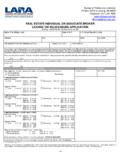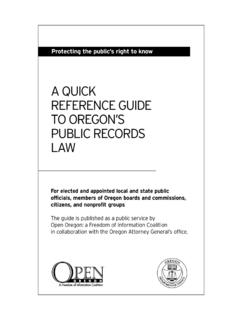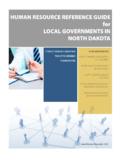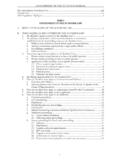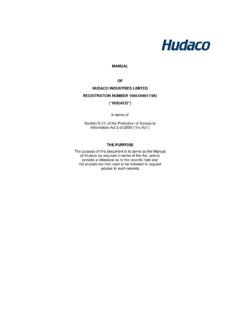Transcription of Local Records Management Manual - michigan.gov
1 STATE OF michigan Records Management Manual FOR Local GOVERNMENTS Records Management Services March 4, 2016 1 Table of Contents: Section Page Number Introduction 2 public Records 3 Retention and Disposal Schedules 4 Disposition of public Records 10 Managing Electronic Records 11 Proper Storage of Records 12 Depositing public Records with 14 Alternative Institutions Regional Depository System 18 Laws: (Freedom of Information Act, Definitions) ( Management and Budget Act, Records Management ) (Historical Commission Act) (Penal Code, public Records ) Note: The michigan Complied Laws are available online at 2 Introduction public Records are the property of the people of the State of michigan .
2 As a result, michigan government agencies are responsible for ensuring that the public Records they create and receive while conducting public business are retained and destroyed in accordance with michigan law. Records Management Services is responsible for assisting Local government agencies with addressing Records Management and preservation issues. While there are various laws that require michigan government agencies to employ sound Records Management practices, agencies often find that good Records Management is good business. Almost every business process employs Records , and agencies need to ensure that these Records are managed in an effective and an efficient manner.
3 Good Records Management can save agencies time and space (resources that are frequently in short supply for most offices). Records Management Services can help Local government agencies: Create Records retention and disposal schedules for Local government offices. Analyze the need for microfilm, microfiche, digital imaging systems and other Records storage media. Follow regulations for reproducing public Records . Appraise Records for long-term value, and identify conservation solutions. Determine the best method of Records disposal. Learn about emerging Records Management issues associated with computer technology. Establish proper storage space for Local government Records .
4 Local governments seeking assistance with their Records Management and preservation concerns may contact: Records Management Services Department of Technology, Management and Budget 3400 N. Grand River Ave. Lansing, michigan 48909 (517) 335-9132 (phone) (517) 321-3408 (fax) 3 public Records The michigan Freedom of Information Act (FOIA) ( public Act 442 of 1976, as amended), defines public Records as recorded information prepared, owned, used, in the possession of, or retained by a public body in the performance of an official function, from the time it is created. Two laws provide that Local government Records belong to the people of michigan .
5 A. Section 491 of the michigan Penal Code (MCL ) declares that all official books, papers, and Records created by (or received in) any office or agency of the political subdivisions of the state of michigan are considered public property, belonging to the people of the state. B. Section 5 of the michigan Historical Commission Act (MCL ) provides that all Records required to be kept by Local public officers in the discharge of their duties, Records required to be filed in Local public offices, and Records which represent memorials of transactions of Local public officers, are considered to be property of this state. Section 491 of the Penal Code (MCL ) declares the improper disposal of Local government Records to be a crime.
6 This law states as follows: Any person who shall willfully carry away, mutilate or destroy any of such books, papers, Records or any part of the same, and any person who shall retain and continue to hold the possession of any books, papers, or Records , or parts thereof, belonging to the aforesaid offices and shall refuse to deliver up such books, papers, Records , or parts thereof to the proper officer having charge of the office to which such books, papers, or Records belong, upon demand being made by such officer, or, in cases of a defunct office, the michigan historical commission, shall be guilty of a misdemeanor, punishable by imprisonment in the state prison not more than 2 years or by a fine of not more than $1, 4 Retention and Disposal Schedules michigan law requires that all Records be listed on an approved Retention and Disposal Schedule that identifies how long the Records must be kept, when they may be destroyed, and when certain Records can be sent to the Archives of michigan for permanent preservation.
7 All Retention and Disposal Schedules must be formally approved by the Records Management Services (DTMB), the Archives of michigan (DNR) and the State Administrative Board. Retention periods listed on approved Retention and Disposal Schedules have the force of law. There are two types of schedules that Local government agencies may use: A general schedule will cover Records that are common to a particular type of Local government agency, such as a county clerk or a school district. General schedules may not address every single record that a particular agency may have in its possession. General schedules do not mandate that any of the Records listed on the schedule be created.
8 However, if they are created in the normal course of business, the schedule establishes a retention period for them. Any record that is not covered by a general schedule must be listed on an agency-specific schedule. These schedules cover Records that are unique to a particular Local government agency. Agency-specific schedules always supersede general schedules. Agency-specific schedules only address the Records of the agency named on the schedule, and may not be used by another agency. Note: Agencies must immediately cease the destruction of all relevant Records (even if destruction is authorized by an approved Retention and Disposal Schedule) if they receive a FOIA request, if they believe that an investigation or litigation is imminent, or if they are notified that an investigation or litigation has commenced.
9 If relevant Records exist in electronic formats (such as e-mail, digital images, word processed documents, databases, backup tapes, etc.), the agency may need to notify its information technology staff. Failure to cease the destruction of relevant Records could result in penalties. Records AND Records SERIES Retention and Disposal Schedules are generally used to identify retention requirements for Records series, but they may also be used to identify specific Records . A Records series is a logical grouping of related Records normally filed together to support a specific business process. Whereas, a record is an individual piece of recorded information.
10 For example, the January 2003 minutes of the meeting of the michigan Historical Commission is an individual record . However, all of the minutes of all meetings held by the michigan Historical Commission, organized chronologically with meeting notices, agendas and supporting documentation, constitute a Records series. 5 GENERAL RETENTION SCHEDULES The general retention schedules that are listed below are approved for use by Local governments. 1. Nonrecord Material Defined (approved 6-2-2015) 2. public Schools (approved 12-7-2010) 3. County Registers of Deeds (approved 10-17-2006) 4. County Treasurers (superseded 9-12-2008 by General Schedule #27) 5.



